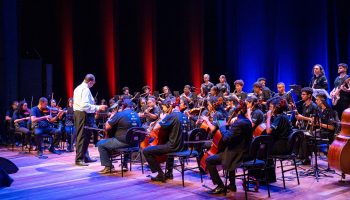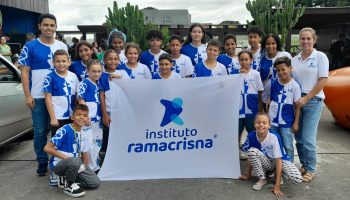How to improve the world without harming the environment? This was the motivating question for the United Nations (UN) to create the 17 Sustainable Development Goals (SDGs). They are part of Agenda 2030, a global action plan created to eradicate poverty and promote quality of life for all. Taking into account the conditions of the planet and without compromising the next generations. In all, 193 countries made the commitment to involve governments, businesses and civil society to improve the world on three pillars: social, economic and environmental.
Meet the 17 Sustainable Development Goals
- Eradication of Poverty
- Zero hunger and sustainable agriculture
- Health and well-being
- Quality education
- Gender equality
- Drinking water and sanitation
- Clean and affordable energy
- Decent work and economic growth
- Industry, innovation and infrastructure
- Reduction of inequalities
- Sustainable cities and communities
- Sustainable consumption and production
- Action against global climate change
- Life in the water
- terrestrial life
- Peace, justice and effective institutions
- Partnerships and means of implementation
Role of NGOs

In IDDRI research, NGOs are classified as key actors to make the Sustainable Development Goals a reality. The study evaluated reports from German and French organizations and established four main forms of action:
- Hold governments accountable
- Communicate sustainable development goals to the public
- Implement projects
- Hold the private sector accountable
Here in Brazil, NGOs like the Ramacrisna Institute are also fundamental for the 17 goals to be met. A survey carried out in 2018, interviewed 676 people, including beneficiaries, employees, customers, suppliers and partners. They pointed out which ODS are more aligned with the operation of the Ramacrisna Institute. The work was carried out by ImpactLab, a consulting company that develops solutions in impact management and innovation for fon-profit and non-profit organizations, associated and aligned with the Sustainable Development Goals.
Below, you can see the SDGs pointed out as the most aligned with the Institute. The size of the bars reflects the degree of involvement of Ramacrisna projects with the goals.

The vice president of the Ramacrisna Institute, Solange Bottaro, explains how this map helps to understand how the projects are seen.
“The performance of Ramacrisna was incredible, as it brought together all the stakeholders in the process. From the 6-year-old child of elementary school, to employees, managers and members of the Deliberative Council. The involvement was complete and everyone experienced the pain of the planet, of vulnerable families and the importance of ALL participating together to change this system that no longer serves a dignified and inclusive life for all.”
Help us to continue putting the goals into practice. You can contribute as a natural or legal person. know how to donate.
Goals that Ramacrisna contributes
In addition to pointing out the Sustainable Development Goals with greater affinity, the interviewees also explained how they saw the Institute’s actions in accordance with the goals:
SDG 10 – Reduction of Inequalities: Ensures and promotes equal opportunities and social and economic inclusion, regardless of age, gender, disability, race, ethnicity or religion.
SDG 4 – Quality Education: Offers complementary education to school for children and adolescents, promoting sociability and creative capacity and stimulating cognitive potential.
SDG 8 – Decent Work and Economic Growth: Promotes training and insertion into the labor market through the Adolescent Apprentice program. And it creates opportunities for professional qualification or requalification.
SDG 16 – Peace, Justice and Effective Institutions: Ramacrisna has been carrying out responsible and transparent work for over 60 years. In addition to valuing ethics and inclusive and participatory management.
SDG 9 – Industry, Innovation and Infrastructure: The Ramacrisna Wire Mesh Factory has modern machinery and adopts sustainable principles.
SDG 5 – Gender Equality: It guarantees the inclusion and equal opportunities of women in its projects. It also conducts lectures and workshops on gender equality and women’s empowerment.
SDG 12 – Sustainable Consumption and Production: It promotes workshops on reused materials for the children of the Ramacrisna Educational Support Center, encouraging the preservation of the environment and multiplying information.
SDG 1 – Eradication of Poverty: ensures the inclusion of socially vulnerable adolescents and youth in projects that promote personal, social and economic development
SDG 3 – Health and Well-being: promotes lectures and workshops to raise awareness and reinforce the prevention of alcohol and drug use. Informs about sexual health, STDs and teenage pregnancy.
ODS 7 – Clean and Sustainable Energy: The Photovoltaic Plant generates clean energy, from a silent source and with immediate savings for social activities.
Minas 2032
The Ramacrisna Institute is the newest member of the Minas 2032 Movement (MM2032), which brings together organizations from the three sectors of civil society to accelerate actions towards the fulfillment of the Sustainable Development Goals (SDGs) of the United Nations (UN). The measure reinforces the organization’s commitment to applying efforts to achieve the 2030 Agenda goals both internally – with employees, volunteers and beneficiaries – and with partners and the population in general.
Led by businesswoman Adriana Muls, in partnership with Orior Institute, “Minas 2032 (MM2032) – for global transformation” proposes a discussion on a lasting and inclusive production model, capable of being sustainable, and the establishment of a standard of responsible consumption. In almost four years of existence, the group has been growing and conquering new partners in the public and private sectors.
Among the participants of MM2032 are Dom Cabral Fundation, Fundamig, FIEMG, ArcelorMittal, Government of Minas Gerais, Band Network, Society of Engineers of Minas Gerais, CEMAIS, OCEMG System, FAPEMIG, BH AirPort, among many other important representatives of the first, second and third sectors in Minas Gerais.
Share this idea. Send this article to a friend to see our project.


